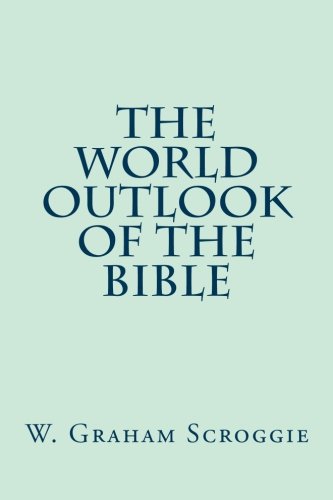Description
THE WORLD OUTLOOK OF THE BIBLE
by
Graham Scroggie D.D.
2014
THE WORLD OUTLOOK OF THE BIBLE. 3
THE WORLD OUTLOOK OF THE BIBLE
In surveying with a view to appraising the missionary enterprise, it is right that we begin at the beginning, by considering what the Bible has to say on the subject, for if the missionary idea and purpose are not in the very warp and woof of Divine revelation, it is to little purpose that the Christian Church spends its time, talent, and money in an attempt to evangelize the world.
That the missionary idea is to be found in the Bible no reader of its pages can deny, but there are comparatively few who know how dominating a place it occupies there. The warrant for the missionary enterprise is not dependent upon proof-texts, though these are many, but is to be found in the very texture of the Biblical revelation. Indeed, it is not an exaggeration to say that if all that relates to God’s redemptive purpose for the whole world were to be extracted from the pages of the Scriptures, scarcely anything would be left.
The missionary enterprise is not something that began in the year 30 A.D., when the Christian Church was born, but is something which, in purpose, is contemporary with human history. This fact will be missed if we do not distinguish between the Divine method and the Divine aim. The aim is what dominates in the New Testament, and the method is what dominates in the Old.
Nothing is further from the truth than that God abandoned a wicked world and chose the people of Israel on whom only to bestow His grace. The fact is that this nation was chosen and disciplined to be the agency of universal blessing, as the covenant which God made with Abram, the father of Israel, plainly declares:
“I will make of thee a great nation, and I will blest thee, and make thy name great, and thou shalt be a blessing. And I will bless them that bless thee, and curse him that curseth thee; and in thee shall all the families of the earth be blessed” (Gen. xii. 2-3).
The relation of the Old Testament to the New Testament has been likened to the hidden foundations on which rest, and from which arise, the beautiful coral reefs of the Pacific. Without the deep substructures of the Jewish race, the Jewish religion, and the Jewish hope, the grand superstructure of Christianity would have been impossible. In the Old Testament we do not see the prosecution of world evangelization, but there we do see the preparation for it. As the Law was a guardian to bring the Jews to Christ, so Judaism was a preparation for and a herald of the full revelation of redemption for all mankind, of which the New Testament is the record.
Before examining the evidence of redemptive universality in all the Scriptures, we must consider briefly certain postulates which underlie all detailed witness to the fact that the outlook of the Bible is universal.
The first of these postulates is:
- The Being and Character of God.
God is not a tribal deity like Chemosh, or Milcom, or Ashtaroth, but is the Creator and Ruler of the Universe:
“In the beginning God created the heaven and the earth” (Gen. i. I).
“God made the heaven and the earth and the sea and all that in them is” (Acts xiv. 15).
“God that made the world and all things therein, He, being Lord of heaven and earth, giveth to all life and breath and all things” (Acts xvii. 24, 25).
The Lord God is “One,” “the living God,” “the only true God” (Deut. vi. 4; I Thess. i. 9; John xvii. 3). He is:
“The King eternal, immortal, invisible, the only wise God” (I Tim. i. 17).
“Who only hath immortality, dwelling in the light which no man can approach unto” (I Tim. vi. 16).
God, being what He is, as all intelligences are the products of His will, they also must be the objects of His care.
The second postulate is:
- The Moral Affinity of Man to God.
The Bible begins by declaring that:
“God said: Let us make man in our image, after our likeness. And God created man in His image; in the image of God created He him” (Gen. i. 26).
As this “image” cannot be physical, it must be mental and moral, and the fact that man is, in this way, kin of God, postulates and presupposes that the purpose of God, whatever it is, embraces all mankind, and it implies also that all men have a capacity for God.
The third postulate is:
- The Fallen Condition of all Mankind.
The Bible tells us that man, endowed with mind and will, and so with moral freedom, rebelled against God, with the result that he who was “made in God’s image and after His likeness” “begat a son in his own likeness, after his image” (Gen. v. 3). In Adam the human race fell.
“By one man sin entered into the world, and death by sin; and so death passed upon all men, for that all have sinned” (Rom. v. 12).
This is the third great postulate of human history, and, like the other two, it bears the mark of universality. The moral need of any man is the moral need of all men.
And the fourth postulate is:
- The Fact of a Redemptive Revelation.
The first prophecy in the Bible is made by God to the devil:
“I will put enmity between thee and the woman, and between thy seed and her seed. It shall bruise thy head, and thou shalt bruise his heel” (Gen. iii. 15).
Undoubtedly this means that “out of the heart of humanity there should arise One who would prove the restorer of the race to the fellowship of God lost by sin.”
As mankind have a common origin, they also have a common need, which is met by what Jude calls, “the common salvation” (3). Here again is the note of universality.
On these four great postulates alike history and revelation rest.
God is infinite and good.
Man is kin of God.
All men are sinners.
Salvation is provided for all.
These facts alone demonstrate the world outlook of the Bible and show it to be from start to finish a missionary Book.
These foundational ideas, however, are far from being all the evidence in the Bible of God’s attitude towards and design for all mankind. These great postulates are supported by a wealth of statement to the same purpose, and this is found in all the Scriptures.





Reviews
There are no reviews yet.